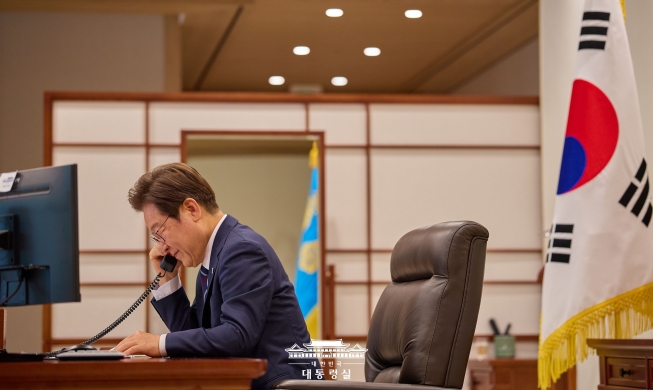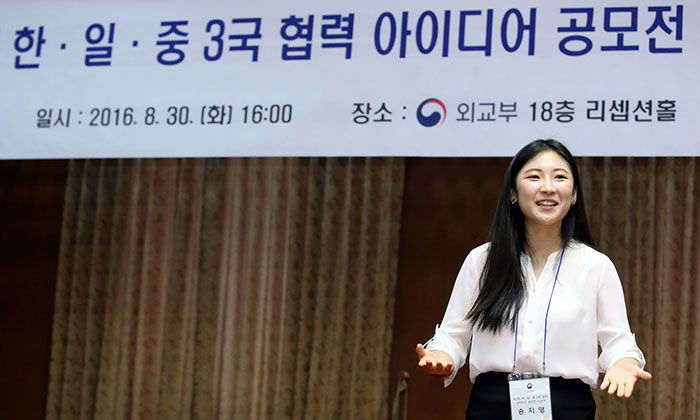
Song Ji-young, won the first prize at the second Korea-Japan-China Trilateral Cooperation Idea Contest, speaks during the awards ceremony at the Ministry of Foreign Affairs on Aug. 30.
Foster Korea-Japan-China experts by being able to major in "trilateral studies." Travel across Korea, Japan and China more conveniently using a single mobile application. Secure business competitiveness across Northeast Asia with roaming data network coverage in all three countries.
A variety of suggestions to improve cooperation between Korea, Japan and China were made recently, not by experts or government officials, but by young members of the public, at the second Korea-Japan-China Trilateral Cooperation Idea Contest, organized by the Ministry of Foreign Affairs. An award ceremony for the winners was held on Aug. 30 at the ministry. The ministry organized the contest, from May 16 to June 30 this year, in order to listen to broader and more diverse ideas about trilateral cooperation between Seoul, Tokyo and Beijing.
A total 436 suggestions were submitted to the jury, and 25 of them, including one first place, four second places and 20 third places, were chosen as winners. Criteria included creativity, efficiency, feasibility and sustainability.
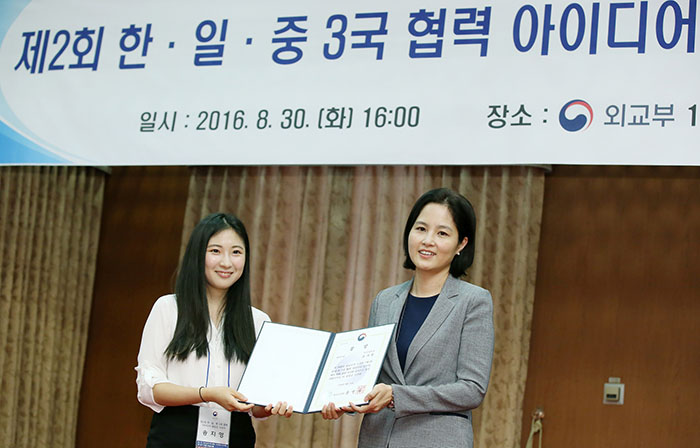
Song Ji-young (left), winner of the second Korea-Japan-China Trilateral Cooperation Idea Contest, and Director Na Yong-wook of the Northeast Asian Affairs Bureau at the Ministry of Foreign Affairs pose for a picture during the awards ceremony at the ministry on Aug. 30.
First place went to Song Ji-young who is currently studying Global Korean Studies at Sogang University. She suggested that if university students were able to major in "trilateral cooperation studies," it would help to develop "trilateral cooperation experts" in the future. Based on the very question of how to deal with the chronic conflicts about history and interpretations of history that exist among the three countries, Song suggested that if universities were to develop a school of "trilateral cooperation studies" as a major, and if an academic curriculum could be developed together by institutions in all three countries, "trilateral cooperation experts" could grow and develop with a balanced and integrated view of the three countries' history, society and politics.
Along with a jointly developed curriculum written by academics and professors in all three countries, she suggested that video classes and joint projects would help, such as forums and competitions in which all three countries could participate. The suggestion even included criteria for universities so that they could develop the area of studies, specific courses and other activities and events, such as online communities and a "trilateral cooperation week" for the students.
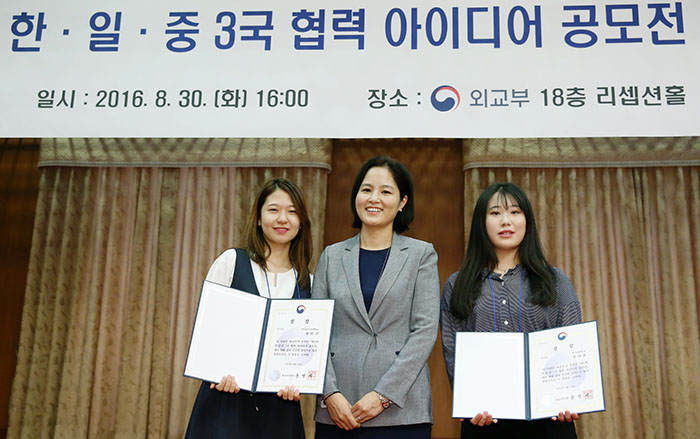
Hwang Min-seon (left), Director Na Yong-wook of the Northeast Asian Affairs Bureau at the Ministry of Foreign Affairs (center) and Kim Na-young post for a picture. Hwang and Kim won second place prizes in the Korea-Japan-China Trilateral Cooperation Idea Contest.
The second place prizes covered tourism and IT. One suggestion was to develop a roaming cell phone network that covered all of Northeast Asia. Pointing out that new roaming regulations would be adopted in 28 EU members starting in 2017, an equivalent Northeast Asian roaming network would help not only tourism but also business and research, said Park Jun-won who is studying Computer Science at Stanford University. Another second place prize went to Hwang Min-seon, who is studying at the Department of Malay-Indonesian of the Hankuk University of Foreign Studies. She suggested that an online lecture website should be developed that features Korean, Japanese and Mandarin figures of speech and idioms. The quality of the lecture videos would be guaranteed by teaming up with a broadcaster in each country, and translating the speeches into each others' languages.
In terms of cooperation on tourism, winning suggestions covered the development of smartphone applications and a traveler's discount card targeted at young backpackers. Kim Na-young, who is studying Business Administration at the Kangnam University said that such a tourism platform is necessary so that the broad range of discussions about tourism that have been made between the three governments could be expanded, suggesting a "Triple Trip" smartphone app. The app would have not only information about tourist sites, but also offer travel products in the three countries. For young backpackers, Park Jun-sung, who is studying Economics and Finance at the Yeungnam University, suggested some sort of youth card that could provide discounts at tourist sites. With an expiration date on the card, demand could then be forecasted relatively easier, he explained.
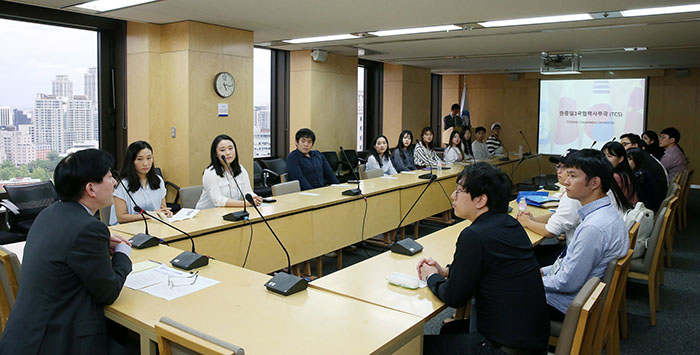
Deputy Secretary-General Lee Jong-heon of the Trilateral Cooperation Secretariat (left) explains potential cooperation projects between Seoul, Tokyo and Beijing to the winners of the Korea-Japan-China Trilateral Cooperation Idea Contest, on Aug. 30 in Seoul.
Alongside these suggestions, ideas covering a broad range of areas, from literature, law, the environment and specific areas such as environmentally friendly eco-car races and voluntary working associations, were all put forward for consideration during the contest.
"It would be quite significant for a government body to adopt the good ideas and suggestions from the young students here today," said Director Na Yong-wook of the Northeast Asian Affairs Bureau at the ministry. She concluded by saying that she was quite impressed that so many young participants taking part in the contest were well aware that trilateral cooperation among Seoul, Tokyo and Beijing was essential today more so than at any time in the past.
By Chang Iou-chung
Korea.net Staff Writer
Photos: Jeon Han, Korea.net Photographer
icchang@korea.kr
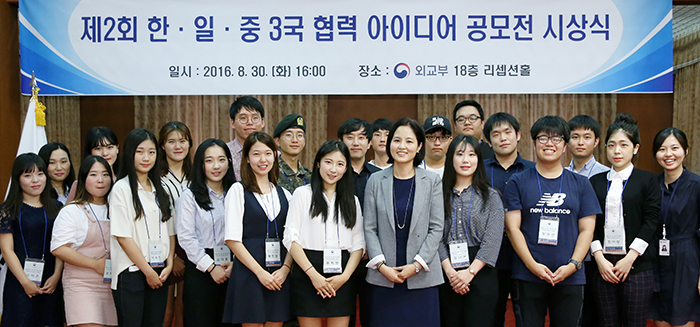
Winners in the Korea-Japan-China Trilateral Cooperation Idea Contest pose for a picture during the awards ceremony at the Ministry of Foreign Affairs on Aug. 30.
